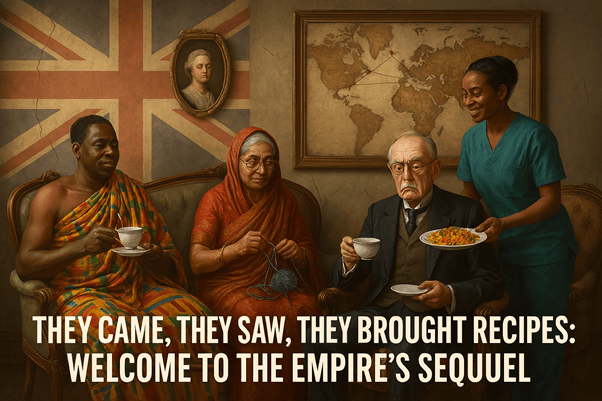Once upon a time—not in a fairy tale—Britain stood atop every mountain, hill, and coconut tree it conquered, declaring, “The sun never sets on the British Empire!”
Fast-forward to 2025, and guess what? The sun hasn’t set; it’s just rising… from the Global South. The Empire’s orphans are now arriving on British soil with suitcases, spices, and surnames like Patel, Oluwatoyin, and Osei. However, former colonisers ask, “Wait, who invited you?” Should we tell them? Let’s ask Nigel Farage, who invited Britain to the Gold Coast. They didn’t need permission, so we don’t need permission today.
When you, Britain, engage in this immigration debate, remember that your audience includes both those who benefited from the empire and those who suffered under it. This conversation isn’t merely academic—it’s personal for millions whose family histories were forever changed by colonial policies. We all stand on the same historical ground, although we’ve experienced it from different perspectives.
When You Colonise the World, Expect the Company
You invaded half the globe and didn’t think Karma was a female dog? Invading sovereign lands with gunboats and bibles, renaming ancient cities after irrelevant British aristocrats. You extracted our gold, diamonds, and timber while leaving empty mines and wounded forests. You forced Indigenous children into missionary schools, where our languages were beaten out of us. You established useless borders that split ethnic groups and created perpetual conflict. You implemented divide-and-rule governance that privileged certain tribes above others.
There was the 1757 Battle of Plassey that secured British control of Bengal. Then there was the 1884 Berlin Conference that formalised the “Scramble for Africa,” which systematically dismantled sovereign nations. You taught Shakespeare from Accra to Mumbai while burning local literature as pagan texts. You transformed self-sufficient economies into export plantations for tea and cocoa that we, the colonised, couldn’t afford to consume. You burnt down the great Benin City in 1897 and stole from her jewels. Today, you display our stolen artefacts in British museums while calling us the original owners’ savages. You criminalised our cultural practices while imposing Victorian morality.
Today, Nigel and his far-right group are taken aback when Akans, Yoruba, Punjabis, Bengalis, and Tamils arrive at Heathrow speaking perfect Queen’s English and holding British passports.
You tend to forget that a tragic psychological irony is at play. Centuries of colonial violence have created trauma bonds. We, the colonised, are drawn to our oppressors through complex mechanisms of Stockholm syndrome and intergenerational psychological conditioning, just as abused children often seek validation from their abusers. We have an unconscious desire for recognition from the empire that taught us we were nothing without your approval.
You can’t shout “civilisation!” to the world and then whisper “invasion” when the world civilises right back.
You can’t loot nations, redraw our borders—and then panic when someone named Mohammed is your next-door neighbour.
Britain didn’t just open doors during colonialism; it tore families apart. So yes, the descendants of that history are now in your living room. And no, they’re not going anywhere. We are family, so we don’t need an invitation to come home.
Farage’s Fear: “White British Becoming a Minority”
Nigel, oh, Nigel. The man is worried that the empire is being reverse-engineered through the immigration line at Gatwick.
Let’s examine the facts: According to the 2021 UK Census, 81.7% of the population in England and Wales is still white, with 74.4% identifying as White British. The “minority” that Farage fears is still decades away.
Commonwealth immigrants—those most connected to Britain’s colonial past—account for just 13% of foreign-born UK residents. Furthermore, research from Oxford University’s Migration Observatory indicates that these immigrants contribute £25 billion more in taxes than they receive in benefits. Between 2000 and 2023, immigrants from former colonies filled 38% of NHS nursing positions and established over 70,000 businesses, creating approximately 1.2 million jobs. These aren’t invaders—they’re keeping British institutions functioning and citizens employed. Historical justice doesn’t come more peacefully than this.
Anti-immigration voices might counter that it’s about “cultural compatibility” rather than numbers. Yet studies from the British Social Attitudes Survey show that 84% of second-generation immigrants identify strongly as British. They speak English at home and participate more actively in civic life than the average UK citizen. So why are immigration restrictionists claiming “British values” are under threat? They’re not measuring values at all—just visible differences.
However, let’s clarify: the UK remains a predominantly white country. It’s just that “white British” is no longer the only narrative.
Translation? The curry has finally surpassed the fish and chips, and some are upset that the spice level is now medium-hot.
Two Realities, One Identity Crisis.
What Britain calls an “immigration crisis,” history calls accountability with interest.
Those Caribbean nurses who rebuilt the NHS? Ghanaian academics at Oxford? Pakistani MPs debating laws in the House of Commons? They are not “foreigners.” They are overdue imperial invoices walking in human form.
You might recognise these “model immigrants” while being concerned about “illegal channel crossings.” However, that distinction merely substitutes overt racism with bureaucratic gatekeeping. The asylum seekers crossing the Channel from former French colonies like Mali and Cameroon are fleeing conflicts. They are fleeing conflicts rooted in the arbitrary borders established during the 1884-1885 Berlin Conference. The documentary evidence directly links today’s migration patterns to yesterday’s colonial maps.
And let’s not pretend. The anxiety isn’t about “too many immigrants.” It’s about too many immigrants succeeding. Nobody complains about white Australians moving in. But let a Sudanese PhD win a teaching post, and suddenly, “Britain is full.”
Tiger’s Roar: This Is Not an Invasion—It’s a Family Reunion

So, dear Britain, let me offer a little perspective with love:
You told the world to become like you. We obliged. Now we speak your language, wear suits, play football, and understand your laws better than half your Lords.
You globalised us. Now, we’re global citizens. You opened the gates. Now we’re inside, not to destroy your country, but to claim our rightful place in it.
Britain must now make peace with its full history—not the tea-and-scones version, but the redacted parts written in sugar, sweat, and stolen gold.
Final Thought: The Empire Was a Boomerang
You threw it out, thinking it wouldn’t come back.
Now it’s coming back, not as a weapon, but as a mirror. And the reflection is broader, more vibrant, and more complex than you ever imagined.
So when next you hear “the white British are becoming a minority,” remember this:
The sun never set on the British Empire, but now it rises from the lands it tried to destroy.
And darling, Karma speaks fluent English.
For Britain to move forward constructively, three steps are essential:
First – comprehensive colonial history should be introduced into national curricula so citizens understand why demographic changes occur.
Second – a formal reconciliation commission should be established to acknowledge the harms of imperial policies while celebrating the resulting multicultural strengths.
Finally – the immigration discourse should be shifted from “crisis management” to “historical continuity”. Recognise that today’s human movement is the natural conclusion to centuries of global British influence. The empire’s legacy could become the foundation for the world’s most successfully integrated society.




